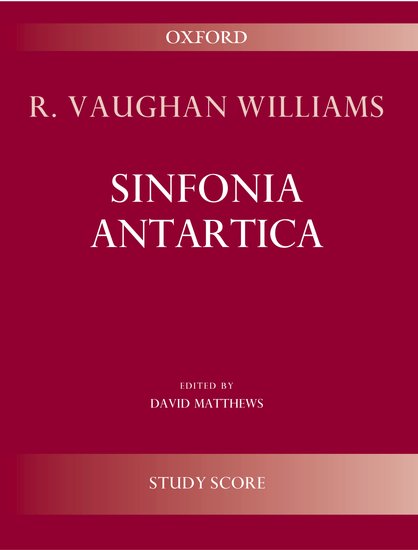By Simon Wright
One hundred years ago this month the bodies of Captain Scott and his companions were discovered, eight months after they had perished from starvation, frostbite, and exposure on their return journey from the South Pole. Ostensibly a scientific and research expedition, Captain Robert Falcon Scott and his party had raced against Roald Amundsen to be first at the South Pole, and lost.
In 1947, Ealing Studios produced an ambitious and dramatic feature film of the story of Scott’s polar trek, which starred John Mills as Captain Scott. Scott of the Antarctic played up the tragedy’s heroic aspects, projecting an ethos of gloriousness in defeat and redemption through failure. Producer Michael Balcon commissioned Ralph Vaughan Williams to compose incidental music for the film. Vaughan Williams, an inveterate cinema-goer, was already composer of music for several significant British feature films produced as propaganda during the Second World War, such as 49th Parallel (1941), Coastal Command (1942), The People’s Land, and Flemish Farm (both 1943).
Vaughan Williams composed substantially more material for Scott than was eventually used (music for twenty-eight sequences in all). He had conceived much of the music before he even saw the screenplay, or rushes of the film. When he knew that he was to be the composer he read around the subject as widely as he could, and already had firmly in mind the materials that he would use. The manuscript, now in the British Library, shows the evocative titles for the various scenes: “Heroism,” “Ice floes,” “Penguins,” “Pony march and blizzard,” “Amundsen’s flag at the Pole,” “Death of Oates,” “Only 11 miles.” The subject matter chimed with themes which ran through Vaughan Williams’s whole life’s work, particularly his notion of a man within a pilgrim’s progress, a life-long spiritual quest for redemption and glory through trial and adversity.
Vaughan Williams once said to Alan Frank (his editor at OUP) that “almost always when I write film music I have an ulterior idea of a concert version in my own mind,” because for composers “in the concert room we are pretty sure we shall not have half the music cut out and the rest inaudible.” Thus, in 1949 he began composing Sinfonia Antartica. In a note for the premiere of the work in 1953, Vaughan Williams said that it was “suggested by the film Scott of the Antarctic which was produced by Ealing Studios a few years ago.” Some of the themes, he said “are derived from my incidental music to that film.” Sinfonia Antartica was first performed by the Hallé Orchestra and Choir, under Sir John Barbirolli (at the time, there was much debate about the title’s correct Italian adjectival spelling!) and it is in this form that Vaughan Williams’s Scott music has become best known to the concert-goer.
The five movement form given by Vaughan Williams to his symphony imposes a musical architecture on material which originated in the sectional narrative and mood painting inherent in film music. The symphony is not a patchwork sewn together from the film score, but a re-ordering and in many cases re-composition of the original material. The composer’s philosophical and objective intent is underlined by his inclusion of poetic superscriptions to each of the movements (printed in the score, but not recited in performance). A quotation from Scott’s journals (“I do not regret this journey… We took risks, we knew we took them; things have come out against us, and therefore we have no cause for complaint.”) replaced a quote from Ecclesiasticus (“Their bodies are buried in peace, but their name liveth for ever more”) for the final movement at the time of publication.
The result is a gigantic (forty minute) reflection on man’s isolation and ultimate vulnerability within the extreme untamed wilderness.
Simon Wright is Head of Rights & Contracts for Sheet Music at Oxford University Press. Our new edition of Sinfonia Antartica is now available, published during the centenary year of Scott’s expedition. New orchestral and vocal materials are available on hire. The score has been checked and edited by David Matthews, and there is an introductory essay on the original expedition and its interpretation in the film by Max Jones, author of The Last Great Quest and editor of Scott’s Journals: Scott’s Last Expedition.
Subscribe to the OUPblog via email or RSS.
Subscribe to only music articles on the OUPblog via email or RSS.
View more about Sinfonia Antartica on the ![]()
Oxford Sheet Music is distributed in the USA by Peters Edition.


[…] Later this summer, we hear Anthony Payne’s re-imagining not of Elgar but of another Vaughan Williams score. At the request of the BBC he has orchestrated the Four Last Songs, written by Vaughan Williams (originally for voice and piano) to poems by Ursula in the last years of his life, and published posthumously by OUP. Payne’s orchestration will be heard at the Royal Albert Hall in a BBC Promenade Concert on 4 September 2013. New versions of works by Vaughan Williams? The composer would most definitely have approved, but that is another story. Simon Wright is Head of Rights & Contracts, Music at Oxford University Press. Read his previous blog post: “Sinfonia Antartica: ‘Good, great and joyous, beautiful and free’.” […]
[…] motif taken from the original 1930s cover designs. Read Simon Wright’s previous blog posts: “Sinfonia Antartica: ‘Good, great and joyous, beautiful and free’” and “The old shall be made […]